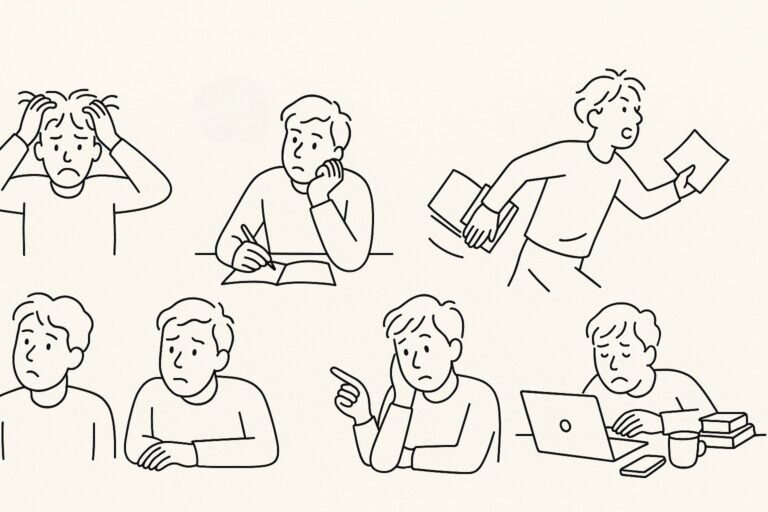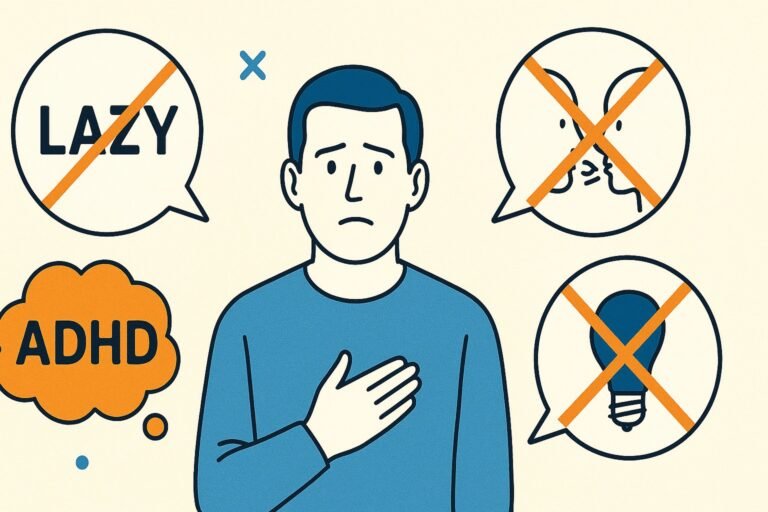ADHD in Adults: Often Overlooked
Most adults with ADHD go undiagnosed, leading to challenges that affect their personal and professional lives. Understanding the symptoms and pathways to diagnosis is necessary for getting the help you need. Late diagnosis can bring relief as you discover that your struggles aren’t just personal failings but part of a larger condition. Recognizing the signs and seeking appropriate treatment can improve your quality of life and build stronger relationships.
Key Takeaways:
- Adult ADHD is frequently overlooked, leading to a lack of diagnosis and treatment in many individuals.
- Common symptoms include difficulties with focus, impulsivity, and emotional regulation, which can impact daily life.
- The NHS provides a specific pathway for ADHD diagnosis, but private clinics also offer alternative routes, albeit potentially at a higher cost.
- Treatment options typically involve medication, coaching, and therapy, tailored to meet individual needs.
- Support in the workplace can significantly enhance productivity and well-being for adults with ADHD.
Understanding Adult ADHD
The experience of ADHD in adults is frequently misunderstood, leading to missed diagnoses and inadequate support. Unlike the childhood stereotype, adult ADHD presents a unique set of challenges that can significantly impact daily life, work, and relationships. It is vital to recognize that this condition does not simply vanish after childhood; many adults continue to grapple with symptoms of inattention and hyperactivity, often unaware that they are dealing with ADHD.
Definition and Overview
Definition: Adult ADHD is a neurodevelopmental disorder characterized by persistent patterns of inattention, impulsivity, and hyperactivity that can adversely affect various aspects of your life. Although often perceived as a childhood condition, studies indicate that around 2.5% of adults in the UK live with ADHD, showcasing the need for greater awareness and understanding of its long-term impact.
Myths and Misconceptions
By addressing some of the prevalent myths surrounding adult ADHD, you can gain a better understanding of your situation and seek the help you deserve. Many people mistakenly believe that ADHD only affects children, or that it is merely an excuse for lazy behavior. These misconceptions can hinder you from seeking a diagnosis and proper treatment.
Hence, it’s critical to clarify these misconceptions. Adult ADHD is not just a phase that individuals outgrow; it can cause significant challenges in focus, emotional regulation, and relationship dynamics. Additionally, acknowledging that ADHD is not linked to intelligence or motivation is vital. Your struggles are valid and require understanding, support, and effective management strategies to improve your quality of life.
Symptoms of Adult ADHD
If you suspect you have adult ADHD, you’re not alone; many adults face significant challenges without proper diagnosis. The symptoms often manifest as persistent patterns of inattention and hyperactivity, leading to difficulties in everyday tasks. You may find yourself struggling with focus, impulsivity, and emotional regulation, which can affect both personal and professional aspects of your life.
Inattention
Below are some indicators of inattention typical in adults with ADHD: you might struggle with staying focused on tasks, frequently misplace belongings, or find it hard to follow through on commitments. These symptoms can lead to feelings of frustration and low self-esteem, as you may feel overwhelmed by disorganization and forgetfulness.
Hyperactivity and Impulsivity
ADHD can also present itself through hyperactivity and impulsivity. As someone with these traits, you might experience a constant sense of restlessness, having difficulty sitting still during meetings or social gatherings. Impulsive decisions may lead to unplanned financial expenses or interpersonal conflicts, often leaving you feeling regretful. It’s imperative to address these issues, as they can impact your relationships, career, and overall well-being. Understanding these signs is the first step in seeking support and applying effective management strategies.
The Diagnosis Process
Unlike many childhood conditions, ADHD in adults frequently goes unrecognized, leading to misdiagnoses or no diagnosis at all. You may find yourself struggling with symptoms like poor focus, impulsivity, and emotional dysregulation without understanding why. The diagnosis process can be a relief, as you finally gain clarity about your experiences and the tools you need to manage them effectively.
Recognizing the Signs
Between persistent inattention, hyperactivity, and impulsivity, recognizing the signs of ADHD in adults can be challenging. You might dismiss your symptoms as just “how you are” or think they are a normal part of life. However, understanding that these behaviors could signal ADHD is the first step in seeking support.
Assessment and Evaluation
Beside recognizing symptoms, a thorough assessment is imperative for diagnosing adult ADHD. Your evaluation typically involves questionnaires and interviews that assess your history and current functioning. A qualified professional, such as a psychiatrist or psychologist, will analyze your responses to gauge the severity of your symptoms and rule out other possible issues.
And during the assessment, it is imperative to provide honest and comprehensive information about your experiences. The evaluator may ask about your academic, work, and relationship history to understand how ADHD has affected you throughout your life. Accurate diagnosis often requires you to provide examples of your behavior in different settings, which can help to confirm the presence of ADHD and identify targeted management strategies that suit your individual needs.

Despite the common misconceptions surrounding adult ADHD, there are effective treatment options available that can significantly improve your quality of life. These options range from medication to therapy, addressing various aspects of the condition. Understanding the right treatment for you can lead to better focus, emotional regulation, and overall well-being, making it necessary to explore all avenues, whether through the NHS or private clinics.
Medications
Treatment for adult ADHD often includes medications that help manage symptoms. Stimulants, such as methylphenidate and amphetamines, are frequently used and can be highly effective. These medications work by increasing levels of certain neurotransmitters in the brain, improving concentration and impulse control. It’s important to discuss potential side effects and monitor your response with your healthcare provider.
Therapeutic Approaches
On the therapeutic side, you might find that cognitive-behavioral therapy (CBT) and coaching can be beneficial. These methods help you develop coping strategies and improve organizational skills, enabling better management of your symptoms.
For instance, CBT focuses on changing negative thought patterns related to ADHD, while coaching provides practical support in setting and achieving personal goals. It’s necessary to find a therapist or coach who understands ADHD and its challenges, as they can help you identify your strengths and weaknesses. Additionally, engaging in mindfulness practices can further enhance your emotional regulation and focus over time.
Living with Adult ADHD
Once again, the challenges of living with adult ADHD can feel overwhelming, as symptoms such as impulsivity and emotional dysregulation complicate everyday life. Many adults find themselves navigating a constant struggle, often leading to frustration in personal and professional settings. Acknowledging your ADHD is the first step towards understanding its impact on your daily experiences and seeking appropriate strategies for management.
Managing Daily Life
ADHD can make managing daily tasks a significant challenge, leading to difficulties in maintaining focus and organization. To cope, you might benefit from implementing structured routines and using reminders to help you stay on track. Breaking tasks into smaller steps can also make overwhelming projects more manageable, allowing you to navigate your responsibilities more effectively.
Coping Strategies
Strategies for coping with adult ADHD can greatly improve your quality of life. Life can feel chaotic, but employing techniques such as time-blocking for tasks, utilizing lists for organization, and practicing mindfulness can help you regain control. Engaging in regular physical activity not only boosts your mood but also helps with impulse control. Additionally, making space for social connections can provide important support as you navigate the challenges of ADHD, fostering understanding and acceptance in your relationships.
ADHD in the Workplace
All adults with ADHD often face unique challenges in their work environments. The symptoms of inattention, impulsivity, and emotional dysregulation can make it difficult to maintain focus, meet deadlines, and navigate workplace dynamics. Especially if left undiagnosed, you may struggle to understand why your performance does not align with your capabilities, potentially affecting professional relationships and career growth.
Challenges Faced
The challenges of managing ADHD in the workplace can significantly hinder your effectiveness. You might find it hard to prioritize tasks, leading to missed deadlines or incomplete projects. This often results in increased stress and frustration, as your efforts may go unnoticed or misinterpreted by colleagues and supervisors.
Support and Accommodations
Above all, understanding and accessible support can make a substantial difference in your workplace experience. ADHD-friendly accommodations could include flexible work hours, designated quiet spaces, or the option to use productivity tools. Companies that prioritize employee well-being can foster an environment where you thrive rather than merely survive.
Another important aspect is that workplaces that provide tailored support not only help you perform better but also contribute positively to the workplace culture. Effective accommodations such as time management training, regular check-ins, and altered workloads can alleviate feelings of overwhelm. Additionally, building a supportive network with colleagues can enhance your job satisfaction and performance, making a significant impact on your professional development.
Final Words
Following this, it’s important to recognize that adult ADHD often remains undiagnosed, affecting various aspects of your life, from work to relationships. Understanding the symptoms and signposts can lead to timely diagnosis and effective management. Whether through NHS pathways or private clinics, you have options available for support. By acknowledging and addressing ADHD, you can enhance your quality of life and achieve your personal and professional goals.
FAQ
Q: What are the common symptoms of adult ADHD?
A: Common symptoms of adult ADHD include difficulties with focus and attention, impulsivity, restlessness, and emotional dysregulation. Adults may find it challenging to complete tasks, manage time effectively, or maintain relationships due to these symptoms. Other signs can include forgetfulness, disorganization, and difficulty prioritizing responsibilities.
Q: Why do many adults go undiagnosed for ADHD?
A: Many adults go undiagnosed for ADHD due to the prevalence of misconceptions that ADHD only affects children. Adults may develop coping strategies that mask their symptoms, leading them to believe they do not have ADHD. Furthermore, the symptoms can overlap with other conditions, making diagnosis more complex. Many healthcare professionals may not ask about ADHD during consultations, further contributing to underdiagnosis.
Q: How can I seek an ADHD diagnosis in the UK?
A: In the UK, you can seek an ADHD diagnosis through your GP, who may refer you to a specialist or an NHS mental health service. Alternatively, you can directly approach private clinics that specialize in ADHD assessments. It’s important to prepare for your appointment by outlining your symptoms and any previous mental health history to facilitate an accurate diagnosis.
Q: What treatment options are available for adult ADHD?
A: Treatment options for adult ADHD include medications such as stimulants and non-stimulants, which can help manage symptoms. Additionally, therapies such as cognitive-behavioral therapy (CBT) and coaching can provide strategies to cope with daily challenges. Workplace accommodations, like flexible hours or task management support, can also aid in managing ADHD symptoms effectively in a professional setting.
Q: How can ADHD affect relationships in adults?
A: ADHD can significantly impact relationships due to symptoms such as impulsivity, emotional dysregulation, and difficulties with communication. Partners may struggle with misunderstandings or frustrations stemming from these behaviors. However, with proper management and open communication, couples can work together to address these challenges, often leading to healthier interactions and stronger relationships.







